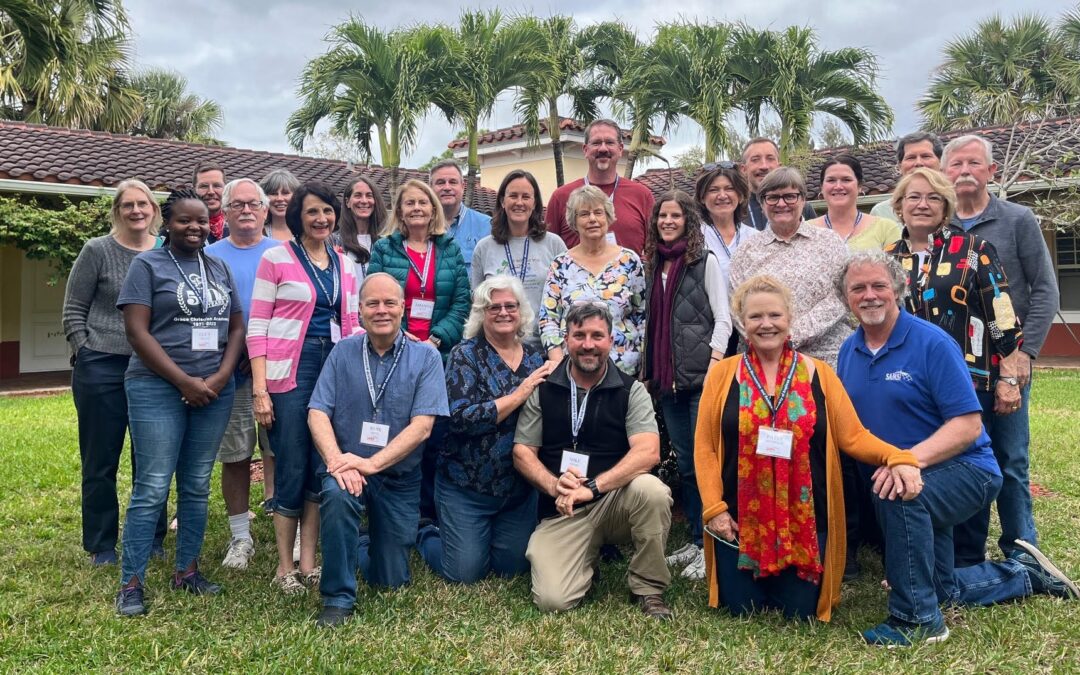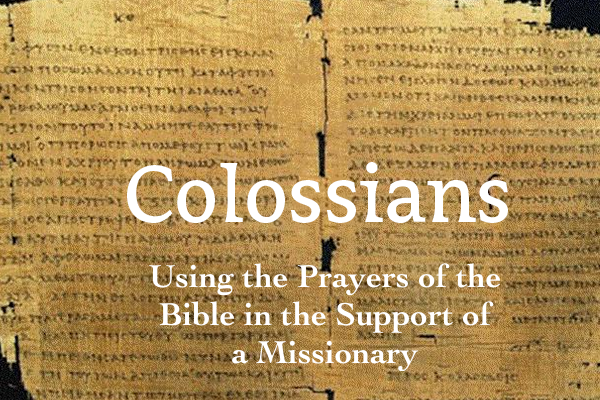
by Brendan Kimbrough | Feb 15, 2024 | Missionary Discernment, Prayer, SAMS Missionaries
SAMS Missionaries and home office staff gathered last week at the Casa San Carlos Retreat Center in Delray Beach, Florida, for a time of refreshment and rejuvenation. The four day retreat provided the Missionaries time to connect with each other and to share what the Lord is doing in their lives. We were led in worship by Hunter Van Wagenen, a SAMS Associate Missionary. Hunter led the group through a series of reflections from his time over the last fifteen years on the Camino de Santiago. Hunter compared and contrasted his experience walking the 500-mile pilgrim’s path in northern Spain to the various stages of missionary service: Preparing to Go, Starting Out, Lost in the Middle, and Finishing Well.
Mike and Kim Miller, SAMS Associate Missionaries who live in St. Petersburg, led the group through the TCK (Third Culture Kids) Care Program that has launched this month to provide resources for Missionary Parents whose children are in the field with them. Mike Miller also led the group through a time of listening to God and thinking about Spiritual Discernment while helping the group apply those disciplines to their current ministries.
His reflections were received very well and were interspersed with break-out groups for times of sharing, listening and prayer. There was plenty of time to walk around the Retreat Center, play games, take group walks at nearby wetlands, soak in the jacuzzi, and talk over meals. On the last day some of the missionaries headed to the beach. Most importantly, God was present and active in the conversations, in the times of prayerful discernment, and in the one-on-one time that each missionary had with the Lord.

by Brendan Kimbrough | Jul 21, 2023 | Prayer, SAMS Missionaries
In this fourth part we continue with the premise from Part I, that much of the content of our prayers can wisely be modeled after the prayers we read in Scripture; and in this particular example, from Paul’s prayers in Colossians Chapter 1. (For a bit more context please see the previous blog post of Part 1 of this series , Part 2 of the series and Part 3. Note: this excerpt is directed toward the Sender who is seeking guidance in the prayer support of a missionary.
“… and increase in the knowledge of God.” (Colossians 1:10)
The personal devotional life of your worker is at stake here. On the field there are many factors that can lead to spiritual drought:
- Your worker may become so busy “working for the Lord” that there is no time for personal intake. He does not take the time to be still and hear from the Lord. The missionary’s head can still nod at the appropriate times; his public prayers can still sound holy; his teaching can still be most proper! Unfortunately, though, he knows the life of the Spirit is gone.
- Loneliness haunts many cross-cultural workers. More susceptible, of course, are single adults. This can lead to seeking inappropriate relationships, which can lead to spiritual dryness. One single woman was continually being harassed by the married people about ‘getting married.’ Unfortunately she found relief from this pressure in a local bar! A kind married couple became her confidants.
- Expectations of the people back home are not met. Some think, “We are paying the bill. We want to see some results.” And generally these results are in the number of conversions. One friend wrote from a very difficult field. He knew that his major work would be “breaking up fallow ground” and he had communicated that to his support team members. But, after six months the people back home were wanting ‘statistics!’ He had none. He was discouraged.
- Failure in task takes its toll on some. Discouragement debilitates. This downward spiral of morale is slippery. At the bottom of the slide are many spiritually depleted field workers. Often, these burned-out workers do not realize that they should go home. They become an embarrassment to the mission endeavor, a drain on the energies of others who are trying to help them and a dismal blot on the testimony of God’s Church in the world.
- Disillusionment can bring an awful frustration, which in turn may lead to spiritual drought. In the mission process there are many tasks that aren’t so glamorous – cleaning the grease trap outside the kitchen door, keeping an inventory on parts, or being reviled by the drunken street-sleeper.
- One may become discontented with other workers. Discontent is putting it mildly. ‘Radical interpersonal relationship problems’ might be more accurate. This is the number one cause of missionary failure. Why? Because Jesus said, “They [the ones your worker has gone out to seek and save] will know they are His disciples by our love for one another.” (John 13:35) So here is a major area of attack by the enemy: If he can destroy our unity he can destroy our testimony!
Your prayers and the united intercession of the prayer support team for your cross-cultural worker will put a hedge of protection around him (Ezekiel 22:30), will ground his thoughts (Philippians 4:4-7) and will give him the wisdom of a peacemaker in those tough interpersonal situations (James 3:13-18).
Shared with permission from Emmaus Road Int’l, Neal Pirolo, Serving as Senders Today, 2023.

by Brendan Kimbrough | Jun 15, 2023 | Prayer, SAMS Missionaries, Senders
Part 3
In this third part, we continue with the premise from Part I, that much of the content of our prayers can wisely be modeled after the prayers we read in Scripture, and in this particular example, from Paul’s prayers in Colossians Chapter 1. (For a bit more context please see the previous blog post of Part 1 of this series as well as Part 2 of the series.) Note: this excerpt is directed toward the Sender who is seeking guidance in the prayer support of a missionary.
“That you might walk worthy of the Lord unto all pleasing…” (Colossians 1:10)
Phillips ‘ translation puts it, “That your outward lives which men see may bring credit to your Master’s name.” Watchman Nee said, “If you want to be a missionary in China, plan on wearing a ‘learner’s permit’ around your neck for the first ten years!” Due to diverse cultural distinctives and your cross cultural worker’s lack of ability to communicate deeply, it is often the love of Christ working through his lifestyle that gives the Gospel message.
Another perspective, of course, is that “What you are doing speaks so loudly, I can’t hear what you are saying!” When your worker’s actions differ from his words, it will be his actions that the people among whom he ministers will believe.
The enemies of the cross gave the name ‘Christian’ (little Christ) to the believers in Antioch (Acts 11:26). It was a dirty word then, but since the followers of the Way were living epistles, known and read by all men (2 Corinthians 3:2), they were easily identifiable. Are we so easy to identify?
A team of college students walked into a remote village in Central America where there were no Christians. Their job was to paint a school building a previous team had built. They were excited to share the Lord, so the weight of their luggage and equipment seemed light.
As they entered the square, they were met by the village captain. He told them that his people had heard all they needed to about this man, Jesus, from the last team. “We don’t want to hear another word you might have to say. Just paint our school building as you said you would. We will watch you. When you have finished, we will let you know if we want your Jesus.”
The team knew that their outward lives would be living epistles, ‘the Word written on the fleshly tablets of our hearts” (2 Corinthians 3:2-3). All that they believed about the Word was put to the test in that village. Those students “walked worthy of the Lord”; when they were ready to leave, ten people including the village captain trusted in Christ as their Savior!
Shared with permission from Emmaus Road Int’l, Neal Pirolo, Serving as Senders Today, 2023.

by Brendan Kimbrough | May 11, 2023 | Prayer, Senders
Part 2 in a series
In this second part, we continue with the premise from Part I, that much of the content of our prayers can wisely be modeled after the prayers we read in Scripture, and in this particular example, from Paul’s prayers in Colossians Chapter 1. (For a bit more context please see the previous blog post of Part 1 of this series) as well as Part 2. Note: this excerpt is directed toward the Sender who is seeking guidance in the prayer support of a missionary.
” …in all wisdom and spiritual understanding.” (Col. 1:9)
It is noteworthy that throughout all of Scripture these two qualities of the Christian life are always twins – one with the other. Wisdom can be defined as “the ability to see things from God’s perspective” and understanding as “the ability to know how to make that Godly perspective work out in day-to-day living.”
One missionary statesman wisely said, “The only ones who know everything about missions are those who have been on the field less than six months!” Bombarded with cultural distinctives, worlds apart from his own culture, and quite possibly faced with methods that have become bogged down in tradition, the missionary continually needs to see things from God’s perspective — things pertaining to family life, ministry, relationships with nationals, economy of time and energy, finances, personal devotions, relationships with ministers on the team and those of other groups.
It is not for nothing that Solomon urges: “Get wisdom, and with all your getting, get understanding” (Proverbs 4:7)! As your prayers ‘bind the strong man’ (Matthew 12:29) so your missionary can have a clear vision from God’s vantage point of eternal values — as your prayers elevate your missionary to realize he is “seated with Christ in heavenly places” (Ephesians 2:6), he must now understand how to make all of it happen in the daily affairs of his life.
Days — even weeks — of extended travel away from home wreak havoc with the scheduled family time. Dare we use God’s money to take a vacation? How do I tell the nationals that we aren’t going to use US dollars to build their building — that it is better for the local congregation to trust God for the provision? How do I not violate my doctrinal distinctives, yet develop a working relationship with others in the Body of Christ? These and a thousand questions bombard your missionary worker’s life and demand an understanding heart (1 Kings 3:9). To see things from God’s perspective is one thing (wisdom); to know how to make them work out in your missionary’s everyday life is another (understanding).
You can see how this prayer for wisdom and understanding could consume hours of intercession as you wage war against the enemy, and help you missionary live in the victory of Christ won for him on Calvary.
Shared with permission from Emmaus Road Int'l, Neal Pirolo, Serving as Senders Today, 2023.

by Brendan Kimbrough | Mar 10, 2023 | Prayer, Senders
Part 1 in a series of 3, maybe 4
Jo Shetler had completed the translation of the Balangao New Testament. A flourishing church had been established. She was now called back to the Philippines to be a speaker at the Balangao Bible Conference. Her subject was prayer.
She said that her prayer life had consisted of “… all we ask God to do, such as heal our sickness, provide money to put children through school, give the ability to learn a language, translate Scripture and interact well with people. Then I decided to pray the prayers of Paul and David and others in the Bible. I copied them out and started in. Wow, did I ever get a surprise. Those people weren’t asking God for the same things I was!”
These ‘model prayers’ from Scripture seemed to center more directly on God and his program, rather than people and their plans.
Read all the articles on prayer; read all the books about prayer. But when you are done, read, study and use as models the prayers of the Bible! One of the prayers of Paul fits perfectly the needs of the cross-cultural worker. He was praying the prayer for the church in Colossae, but note how adaptable it is to the needs of any missionary.
Even before he prayed, Paul twice assured those at Colossae that he was constantly praying for them. Look at Colossians 1:3 and 9. “We always thank God…when we pray for you,” and “…we have not ceased to pray for you, from the day we heard…” Everyone who is interested in praying for a missionary will at one time or another breathe a prayer for him or her. Certainly the financial support team will pray as they write out their checks: “Lord may they use this money wisely,” or “Lord do they really need this money more than I do?”
The communications support team will no doubt pray that the missionary will have time to read the email that they wrote and that it will minister to them. The moral support team will surely whisper a prayer as they see the missionary’s picture on the church bulletin board or when the pastor leads a congregational prayer for them. But if you are going to be part of your missionary’s prayer support team, your commitment must be more on the level of Paul’s statement, “….we have not ceased to pray for you, from the day we heard…”
Here, then, is a prayer you can use as a model as you pray for your cross-cultural worker, filling in the details of their specific personality and ministry needs:
“That you might be filled with the knowledge of his will.” (Col. 1:9)
Once a worker arrives in the field, they are bombarded with an overwhelming array of ministry opportunities. Even if a pre-determined job description has been established, there is always one more assignment to fit into the schedule. When joining a team that is short-handed by illness, or workers on home assignment, or lack of laborers for an expanding ministry, your cross-cultural worker may be faced with appeals to take on ‘just a little bit more.’
Out of that mass of good deeds, the missionary must discern those that were “beforehand determined that he should walk in” (Ephesians 2:10). Once the will of God has been heard, a corollary prayer is that the missionary judiciously share with the supervisor or team that, in order to maintain his sanity he must say ‘no’ to certain opportunities.
Shared with permission from Emmaus Road Int'l, Neal Pirolo, Serving as Senders Today, 2023.



